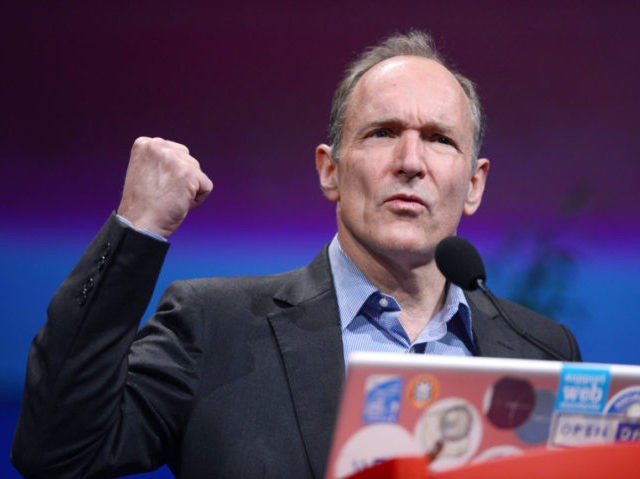Twenty-eight years ago, Sir. Tim Berners-Lee Invented the World Wide Web. Today, he published a list of proposals in The Guardian that would surely destroy it.
Introducing his proposals, Berners-Lee writes of the “recurring battle” to keep the web open, or as he puts it, to “allow everyone, everywhere to share information, access opportunities, and collaborate across geographic and cultural boundaries.”
He’s right. In theory, the World Wide Web — the now-ubiquitous system of URLs and hypertext links connected by the internet — allows anyone to share information of any kind, with anyone. But it has become dominated, in recent years, by a number of big companies: notably Google, Facebook, and to a lesser extent Twitter. Information that flows through these platforms is routinely censored, redirected, and moderated by Silicon Valley elites with political agendas.
That’s a real threat to the original vision of the Web. But Berners-Lee doesn’t seem particularly concerned by it. Instead, he wants to work with the social media empires to tackle what he sees as the real problem facing the web – “fake news.”
We must push back against misinformation by encouraging gatekeepers such as Google and Facebook to continue their efforts to combat the problem, while avoiding the creation of any central bodies to decide what is “true” or not.
Berners-Lee also believes that some forms of speech on the web are “unethical,” and must be stopped.
One source suggests that in the 2016 US election, as many as 50,000 variations of adverts were being served every single day on Facebook, a near-impossible situation to monitor. And there are suggestions that some political adverts – in the US and around the world – are being used in unethical ways – to point voters to fake news sites, for instance, or to keep others away from the polls. Targeted advertising allows a campaign to say completely different, possibly conflicting things to different groups. Is that democratic?
Following his logic, we must rely on entities like Facebook and Google to filter out the “unethical” information.
Not all of Berners-Lee’s suggestions are wacky. For example, he raises the issue of web users’ personal data, and how much of it is now in the hands of governments and corporations. He even suggests that the fact that all our online activities are now tracked could create a chilling effect on free speech.
But he does not acknowledge how a crackdown on “unethical” information is its own form of censorship. This didn’t escape the notice of users on Slashdot, one of the web’s oldest tech forums. As one user put it:
Free exchange or censorship. Pick one. And besides, censorship never fixed the problem of fake news. The only solution to fake news is for readers not to be gullible.
Others pointed out that falsehoods spreading through the web is not exactly a new problem (as any high school student who has tried to cite Wikipedia in an essay is no doubt aware).
It’s also pretty funny that he thinks misinformation is some new problem because Trump was elected or whatever – Information on the web has always been wildly untrustworthy, it’s just that the dumb shit public have been gradually brainwashed by massive corporations to accept it as some authoritative source to sell more advertising.
The essence of the web, as Berners-Lee readily acknowledges, is free and open communication. The threat to that is gatekeepers like Google and Facebook, not myths and misinformation (both of which have always been on the web). Sadly, it seems the panic over “fake news” has made the Web’s inventor willing to embrace the very gatekeepers that are undermining the original openness of his creation.
You can follow Allum Bokhari on Twitter and add him on Facebook. Email tips and suggestions to abokhari@breitbart.com.

COMMENTS
Please let us know if you're having issues with commenting.